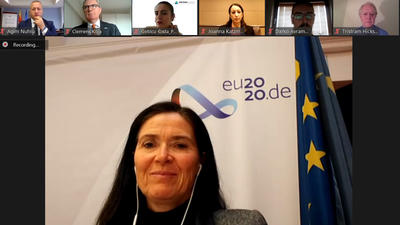-
Our work
-
Fields of work
- Arms control
- Border management
- Combating trafficking in human beings
- Conflict prevention and resolution
- Countering terrorism
- Cyber/ICT Security
- Democratization
- Economic activities
- Education
- Elections
- Environmental activities
- Gender equality
- Good governance
- Human rights
- Media freedom and development
- Migration
- National minority issues
- Policing
- Reform and co-operation in the security sector
- Roma and Sinti
- Rule of law
- Tolerance and non-discrimination
- Youth
- Field operations
- Projects
-
Meetings and conferences
- Summit meetings
- Review Conferences
- Ministerial Council meetings
- Plenary meetings of the Permanent Council
- Plenary Meetings of the Forum for Security Co-operation
- Security Review Conferences
- Annual Implementation Assessment Meetings
- Economic and Environmental Forum
- Economic and Environmental Dimension Implementation Meetings
- Human rights meetings
- Media conferences
- Cyber/ICT security conferences
- Conference of the Alliance against Trafficking in Persons
- Gender equality conferences
- Annual OSCE Mediterranean conferences
- Annual OSCE Asian conferences
- Partnerships
-
Fields of work
-
Countries
- All
-
Participating States
- Albania
- Andorra
- Armenia
- Austria
- Azerbaijan
- Belgium
- Belarus
- Bosnia and Herzegovina
- Bulgaria
- Canada
- Croatia
- Cyprus
- Czechia
- Denmark
- Estonia
- Finland
- France
- Georgia
- Germany
- Greece
- Holy See
- Hungary
- Iceland
- Ireland
- Italy
- Kazakhstan
- Kyrgyzstan
- Latvia
- Liechtenstein
- Lithuania
- Luxembourg
- Malta
- Moldova
- Monaco
- Mongolia
- Montenegro
- The Netherlands
- North Macedonia
- Norway
- Poland
- Portugal
- Romania
- Russian Federation
- San Marino
- Serbia
- Slovakia
- Slovenia
- Spain
- Sweden
- Switzerland – OSCE Chairpersonship 2026
- Tajikistan
- Türkiye
- Turkmenistan
- Ukraine
- United Kingdom
- United States of America
- Uzbekistan
- Asian Partners for Co-operation
- Mediterranean Partners for Co-operation
-
Structures and institutions
- Chairpersonship
-
Secretariat
- Secretary General
- Office of the Secretary General
- Conflict Prevention Centre
- Transnational Threats Department
- Office of the Special Representative and Co-ordinator for Combating Trafficking in Human Beings
- Office of the Co-ordinator of OSCE Economic and Environmental Activities
- Gender Issues Programme
- Opportunities for Youth
- Department of Human Resources
- Department of Management and Finance
- Office of Internal Oversight
- Documentation Centre in Prague
- Institutions
-
Field operations
- Presence in Albania
- Centre in Ashgabat
- Programme Office in Astana
- Programme Office in Bishkek
- Mission to Bosnia and Herzegovina
- Programme Office in Dushanbe
- Mission in Kosovo
- Mission to Moldova
- Mission to Montenegro
- Mission to Serbia
- Mission to Skopje
- Project Co-ordinator in Uzbekistan
- Closed field activities
- Parliamentary Assembly
- Court of Conciliation and Arbitration
- Organizational structure
- About us
News Item
OSCE workshop promotes social re-use of confiscated assets in Serbia and North Macedonia
Promoting the social re-use of assets confiscated from criminal activity was the focus of two online workshops for Serbian and North Macedonian civil society organizations, law enforcement practitioners, asset management agencies and prosecutions offices, which were held on 7 and 10 December 2020. More than 30 participants attended. The workshops are part of a series of national workshops the OSCE is organizing for five South-Eastern European countries to promote the social re-use of assets as an efficient tool in preventing and fighting against organized crime and corruption...

- Issued on:
- Issued by:
- OSCE Secretariat
- Fields of work:
- Policing, Economic activities
Promoting the social re-use of assets confiscated from criminal activity was the focus of two online workshops for Serbian and North Macedonian civil society organizations, law enforcement practitioners, asset management agencies and prosecutions offices, which were held on 7 and 10 December 2020. More than 30 participants attended. The workshops are part of a series of national workshops the OSCE is organizing for five South-Eastern European countries to promote the social re-use of assets as an efficient tool in preventing and fighting against organized crime and corruption.
The events were organized as part of the OSCE extra-budgetary initiative led by the OSCE Secretariat’s Transnational Threats Department and the Office of the Co-ordinator of OSCE Economic and Environmental Activities on asset recovery-related efforts in South-Eastern Europe.
The workshops aim to reinforce the importance of asset re-use for social purposes among government agencies and civil society; build awareness of the infiltration of organized crime money in the legal economy; and foster a public discourse on the role of civil society in the fight against organized crime and corruption.
Opening the meeting for Serbian participants, Carlo Lo Cascio, Italian Ambassador to Serbia, said: “In line with the goals of the project, we have also emphasized and supported the importance of a joint response to organized crime involving civil society, that in Serbia — and in the Western Balkans — should play a fundamental role in developing a common effort towards the progress needed.”
Ambassador Clemens Koja, Head of OSCE Mission to Skopje addressed the attendees of the workshop for North Macedonia, and highlighted the importance of a multi-stakeholder approach. “There can be no real progress in increasing accountability and transparency, without the reinforced joint efforts between governments and civil society organizations.”
During both workshops, participants were familiarized with the national legislative framework under which assets can be socially re-used. They also learned from international civil society organizations and experts on best practices to convert confiscated assets into safe places for communities and use them for social, cultural and rehabilitation purposes.
The donors of this cross-dimensional project are the United States Department of State, Italy, Germany and the United Kingdom.